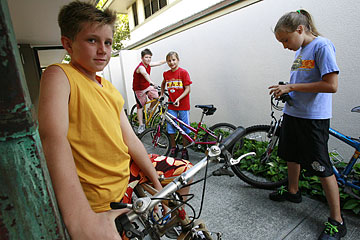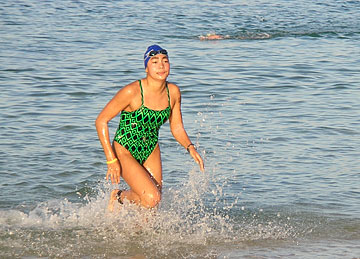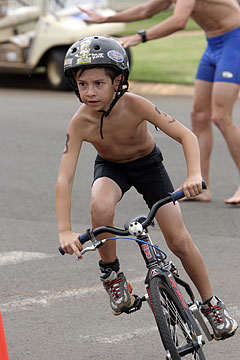SWIM - BIKE - RUN

CINDY ELLEN RUSSELL / CRUSSELL@STARBULLETIN.COM
Tanner Anderson, 11, his brother Bowen, 9, Claire Rossi de Leon, 9, and her sister Isabelle, 11, have entered numerous kids triathlons
|
|
Kids Like Tri
Events that combine swimming, running and bicycling attract more and more island youngsters
FOR THOSE who participate, it's a passion. Others deem it an insane pursuit -- on a good day. After all, who would want to combine three of the most physically challenging sports into one steady quest for pain?
More and more people each year, it turns out. From one long race for a few crazy folks nearly 30 years ago, the sport of triathlon has since grown beyond anyone's wildest dreams, joined the Olympic establishment and secured its place in the future of athletics.
In Hawaii -- arguably the birthplace of triathlons -- many believe the future lies in young people gravitating to the sport.

COURTESY DUDLEY FAMILY
Michelle Dudley, 14, started doing triathlons when she was 11. She's in the process of graduating to adult events.
|
|
Though Hawaii lags behind the mainland, where a plethora of development camps and races for young athletes (often partnered with large events for adults) are prevalent, Oahu boasts at least five triathlon clubs. A few people are lobbying to get at least one of those coaches to train children interested in learning more about the art of combining swimming, biking and running into one endeavour -- especially now that the 4-year-old Keiki Triathlon Series is growing.
Six races on three islands will comprise the Keiki Triathlon Series this year, with more than 300 kids participating. Some are so thrilled that they keep their race numbers -- etched on arms and legs in permanent marker -- when they return to school after the weekend.
"And their friends are saying, 'What's that? I want to do that.' " said JJ Johnson, president of Pacific Fitness Alliance and now the organizer of children's events. "It's really the kids who are pushing the series." He estimates that about 60 new kids tried the sport last year.
Steve Dewald's three sons have participated in the Keiki Triathlon Series for several years. He said it benefits the entire family. Jakob Dewald completed his first biathlon at Lavaman on the Big Island at age 5. Now 8, he ran 1:06 in the Great Aloha Run in February, and is preparing for the 10-mile volcano run on the Big Island. Though Steve also is a triathlete, he and his wife don't push Jakob, who's won his age group in every triathlon he's entered. Steve's two older sons, Lindsey, 11, and Stephen, 10, take a less competitive approach. They participate just for fun.
"For us it's great," said Dewald, a landscape contractor and president of Steve's Gardening Service. "By the time I work and I want to train, it's pretty easy to neglect the family." He includes his sons in shorter, recovery workouts, and when Steve runs more than 10 miles, Jakob accompanies him on a bike.
Having events to look forward to is "huge for all the kids," said Dewald, who has noticed friends and neighbors leaving behind the television and video games to "train" for a September event at the Hawaiian Waters Adventure Park.
"We had some real issues with team sports," Dewald said. "Some parents get so competitive that they lose sight of the fact that it's supposed to be fun for the kids. With this, you're doing your own thing, and there's no pressure that you're letting anyone else down." Some children, like Jakob, know their competition. Others, he's noticed, come out with training wheels on their bikes.
Best of all, "race organizers don't push it so hard that it's not fun for the new kids."
Johnson believes that starting out in triathlons, even if it's only a hobby, can initiate a lifetime pursuit of fitness.
"Typically, kids get involved with soccer and basketball and Pop Warner," he said. "But there's another sport out there. And the nice thing is that parents can get involved as well."

COURTESY JJ JOHNSON
Jakob Dewald has won his age group in every triathlon he's entered. His brothers take a less competitive approach.
|
|
Even better, he said, is that people can continue swimming, biking or running long after they leave school.
Whether active adults pass along their enthusiasm to their kids, or the other way around, is difficult to measure. Regardless, a steady influx of new people into the sport has been enough to sustain events and keep coaches in business.
The Tinman Triathlon in July attracts about 500 newcomers to the sport every year, said Brian Clark, who has trained adults for that race since 1979. An average of 1,000 people participate in the race; about half of them are first-timers, according to surveys on the entry forms.
New people wanting to complete the Tinman is "how I stay in business," Clark said.
Women provide another infusion of fresh enthusiasm. KC Carlberg, a coach and race director, actively recruits females to a fit lifestyle they can sustain. Since its inception, the women-only Na Wahine Sprint Triathlon in September has attracted several hundred participants, 50 percent of them first-timers and many of them women who would not otherwise attempt a triathlon.
The lure? "It's a sprint distance (400-meter swim, 13-mile bike ride, 3.1-mile run), it's a supportive event and it's well organized, so they don't feel as intimidated," said Carlberg, who created the race, as well as a girls-only biathlon, and coaches about 300 women in her triathlon, marathon and fitness groups throughout the year.
RATES OF OBESITY have risen over the years, dwindling school budgets threaten the demise of PE programs and video games are prominent activities in many households. Races help establish good habits at a young age. Even if people are not competitive, having a goal "is very important," said Claire Tong, public relations representative for Hawaii Pacific Health.
The reason Straub Clinic & Hospital sponsors the Women's 10K and keiki triathlons is because "it's our responsibility as a health care organization to make sure everyone is taking care of themselves ... and it's always about exercise and diet."
Ted Leon agrees. As a physician at the Queen's Medical Center, where he works part time in the weight management center, he sees the devastating effects of an unhealthy lifestyle on a daily basis, and positive results when someone makes changes. He was thrilled to report that one patient lost more than 100 pounds and completed the Great Aloha Run in February.
Avoiding issues related to weight has to start at a young age. But that's not a problem in the Leon family.
Isabelle Rossi de Leon, 11, and her sister, Claire, 9, have participated in several triathlons, following the lead of their father, who has completed Ironman distance races (2.4-mile swim, 112-mile bike ride, 26.2-mile run). The Leon sisters even entered the Ironkids triathlon after their father competed in Ironman France a couple of years ago. Locally, they often bring along neighborhood friends who have never been exposed to such events.
"Some kids get really competitive, but I just do it for the fun of it," said Isabelle, who just finished fifth grade at Noelani Elementary School. "It's just a chance to figure out what I can do. Even the training is fun."
Her favorite part of the experience? "I guess the finish. It's even better than after I perform (dancing). You feel like you actually did something."
Perhaps more exciting than the actual race is the post-event music, pizza and medals for everyone. "It seems like that's more important than the race, especially since I do it with a couple of friends," Isabelle said.
The girls' mother, Elaine Rossi de Leon, believes the three-sport events are especially good for kids "because everyone has a chance to shine in something." Even better, "the people who run these events insist that the parents back off." Who places first or last matters far less than everyone feeling safe, having fun and finishing, she said.
MICHELLE DUDLEY, 14, still a star in the keiki series, which she started doing when she was 11, is now in the process of graduating to adult events such as the North Shore Challenge, the Na Wahine Sprint Triathlon and the Haleiwa Triathlon. Next month, she'll attempt her first Tinman Triathlon (half-mile swim, 25-mile bike ride, 6.2-mile run).
"When I first started, I thought it was kind of hard, but after a while it started to be fun," said Dudley, a freshman at Pearl City High School who began swimming at age 4.
Who knows? She could be the next national champion. After all, Hunter Kemper, the current United States Triathlon National Champion, started his racing career in children's events. A friend encouraged Kemper to enter his first youth triathlon in 1986. He came in first place and qualified for the IronKids National championships, which he won at age 10. Growing up, he enjoyed success as a runner and swimmer in high school and college before devoting himself seriously to multisport.
A new generation of triathlon devotees is emerging, but JJ Johnson wants to take it a step further. He hopes to raise awareness and help triathlon become a recognized sport in Hawaii's middle schools and high schools. "I want it to be as popular as tennis and track and field. After all, how are we going to grow this sport if we don't pass it on?"
Passing it on is important for many reasons, including the ability to pursue fitness into old age. "I love triathlon because it's an individual sport, but you can train in a group," said Carlberg. "It builds character. When you're out there, you learn a lot about yourself and how much you can take."
YOU LIKE TRY?
What: Candyland Keiki Sprint Triathlon
When: Sept. 16
Where: Hawaiian Waters Adventure Park.
Age groups: Ages 7 to 10: 7:30 a.m. (50-meter swim, 3-mile bike ride and 1-mile run)
Ages 11-14: 8:15 a.m. (100-meter swim, 5-mile bike ride and 1.5-mile run)
Call: 591-9839
On the Net: www.bocahawaii.com
What: Jamba Juice Keiki Triathlon Race Series Championship
When: Oct. 7
Where: Ko Olina Resort
Call: 286-4430
On the Net: www.koolinatriathlon.com
|

